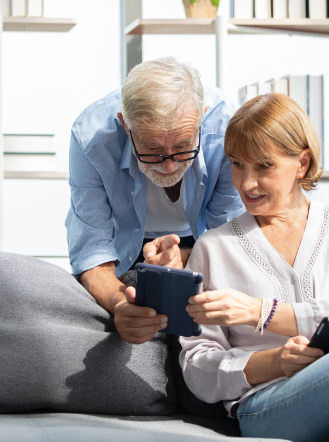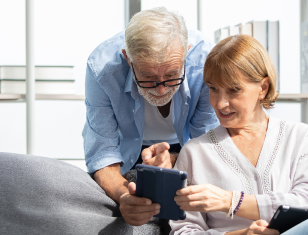A Senior’s Guide to Growing Houseplants
Gardening can be a calming and stimulating endeavor post retirement. Studies suggest that gardening is associated with several health benefits for seniors, including enhanced cognition, stress reducti...

By Modern60
Last Updated on,
June 13th, 2023

Hair coloring can be a rejuvenating experience regardless of whether you’re a teen or a 70-year-old. It’s an idea worth considering if you want to cover those pesky gray strands, experiment with a funky color, discover your unique style, or just have some fun with your hair. The tips that follow will help you find the best hair color that suits your personality and helps add to your confidence.
Seeking the expertise of a professional hairstylist is highly recommended when choosing hair color for seniors, especially if you want to experiment with blues and purples. A skilled hairstylist will assess your hair type, texture, and condition and then create a custom color formula that suits your needs. The professional will also ensure the application process is carried out safely, minimizing potential damage to your hair. So, schedule an appointment with a trusted hairstylist who can guide you during your hair coloring journey.
If you’ve decided to color your hair, it’s crucial to choose a shade that complements and enhances your features, such as your skin undertones. For example, if you have warm undertones like yellow or peach, consider rich and warm shades like golden blonde, chestnut brown, honey, and caramel. You might want to lean toward ashy blondes and cool chocolate browns if you have cool undertones like pink or blue. Choosing a color in sync with your skin tone will bring out your natural beauty and help you achieve a more authentic look.
With age, you might not have the strength to visit the salon frequently for touch-ups and improvements. So, consider low-maintenance colors that can save you time and effort. Balayage, for example, is a popular technique that involves hand-painting highlights onto your hair. These highlights are painted softly so the new roots aren’t easily noticeable after regrowth, thus eliminating the need for a touch-up. Another low-maintenance tip is selecting shades close to your natural hair color that blend seamlessly with your roots. It will prolong the time between salon visits and provide a perfect gradation, which is necessary for older ladies with colored hair.
Highlights and lowlights can provide your hair depth, dimension, and a youthful glow. Highlights involve lightening a few strands of hair, while lowlights involve darkening them. Both techniques can create contrast and movement, making your hair appear fuller and more vibrant. When trying them, choose shades only slightly lighter or darker than your base color. This subtlety will add a sun-kissed effect and bring a radiant glow to your complexion. But if you want something loud, don’t let age restrict you. Many older women sport pink hair, blue hair, or even rainbow hair with confidence. Work with your hairstylist to determine the right technique and placement for your desired outcome and hair type.
Getting used to a new shade can take time, especially for women who have never colored their hair before. So, it’s okay to start with soft and subtle color transitions and avoid a complete makeover in your first salon visit. Gradual changes will help you adjust to the new shade more comfortably. For example, starting with a few face-framing highlights will allow you to experiment with different tones and find the perfect balance that enhances your features and boosts your confidence.
With age, it’s natural for your skin to become delicate and show imperfections like fine lines and wrinkles. For a more youthful skin appearance, choose a shade that’s either lighter or darker than your natural hair color. It will soften harsh lines and create a flattering overall appearance.
If you’re hesitant to commit to a particular hair color or unsure about how it will look on you, use temporary shades to test the waters. Temporary colors, such as rinses and sprays, allow you to experiment without worrying about being stuck with something you don’t like. They’re excellent for older women trying blue, purple, pink, green, or other unusual shades for special occasions or fun events. Although temporary colors can be washed out easily and are worn only for a few days, make the most of it by choosing a shade that helps you express yourself and enhances your natural beauty.
When coloring your hair, you might also want to touch up your eyebrows as they become lighter or grayer with age. Use a simple brow pencil or powder to enhance your brows and match them to your new hair color. It will help frame your face and create a cohesive look.
Gray hair can be a beautiful feature, but if you prefer to cover it, choosing the right approach is crucial. When coloring gray hair, older women should select shades that closely match their natural hair color. Going too dark can create an unnatural contrast, while going too light can wash out your complexion. Additionally, consider using a hair dye specifically formulated for gray hair coverage. These dyes often have enhanced pigments that penetrate and cover stubborn grays for a consistent and long-lasting result.
When selecting a hair color, pause for a while to consider your lifestyle and personality. Are you a busy woman who is always on the go with little time for hair maintenance? Do you often attend social events with your family and friends? Your lifestyle should influence your hair color choice. Go for shades that require minimal upkeep if you have a hectic schedule. But if you enjoy experimenting with different hairstyles and have time for maintenance, give vibrant or high-maintenance colors a try. Your hair should reflect your personality and complement your lifestyle, allowing you to feel your best wherever you go!
The art of hair coloring is constantly evolving, with salons offering new techniques for achieving unique and fashionable looks. Ombre and color melting are two names that might come up when discussing innovative coloring techniques with your stylist. Ombre provides a gradual color transition from darker roots to lighter ends, creating a stunning contrast. On the other hand, color melting blends multiple shades seamlessly, creating a multidimensional and eye-catching result. These techniques can add depth and dimension to anyone’s hair, irrespective of age.
If you can’t figure out a hair color or style, browse through pictures in magazines, websites, and social media platforms, or simply look around and observe older ladies with colored hair. You never really know what can catch your eye and serve as inspiration for your new style. You can also look at celebrities your age for ideas. Many older celebrities rock fabulous hair colors that you might want to try. If a photograph of a hairstyle resonates with you, carry it to the salon for reference. The expert can look at it and provide suggestions based on your preferences, skin tone, and hair type. But remember, it’s essential to choose a hair color that not only looks great in photographs but also makes you feel confident and beautiful.
Besides looking for help in magazines and websites, talk to your friends, peers, or fellow seniors who have colored their hair. They can share their tips and experiences and even recommend trusted hairstylists who specialize in applying hair color for seniors. By exchanging ideas and discussing different options, you can make informed decisions about your hair coloring journey. The best advice often comes from those who have walked a similar path.
Before committing to a full hair color application, consider doing a patch or strand test. This involves applying a tiny amount of the product to a discreet section of your hair to see how it reacts and whether you like the result. Testing helps you avoid unexpected or undesired outcomes and allows you to make adjustments if necessary.
Although looking for advice is a good idea, ultimately, the perfect shade is the one that makes you feel confident, beautiful, and true to yourself. Even if you’re 60, 70, or older, let your age not restrict you from picking a color that makes you happy. Your hair color is an expression of your personality and style, and it should reflect the vibrant, dynamic, and amazing person you are!
While hair coloring can work wonders for older women, having realistic expectations is important. Understand that achieving certain shades may require multiple sessions at the salon or additional treatments, especially if you’re transitioning from a dark color to a lighter one. Similarly, older ladies wanting blue hair, pink hair, or other vibrant colors may have to give the hairstylist sufficient time to create a safe formula. So, be patient and trust the process, knowing that the expert is working to achieve the best results while prioritizing the health of your hair.
Hair coloring should be an enjoyable and transformative experience, even for women 70 or over. Embrace the opportunity to try something new and have fun with it. After all, you won’t always receive the pampering and self-care that comes with a salon visit or a DIY coloring session. And remember, hair colors can be changed, so don’t be afraid to take risks and explore different shades until you find one that makes you feel truly radiant!
Your hair coloring journey doesn’t end once you get your perfect shade. Proper hair care and maintenance are essential for preserving the health and vibrancy of your newly colored locks. Here are a few things older ladies with colored hair should do after their final session at the salon:
Many shampoos and conditioners in the market prevent hair color from fading. They have the same basic cleaning ingredients but ensure your freshly-applied dye doesn’t run down the drain after each wash. When at the store, choose a product specifically formulated for seniors with colored hair.
The sun’s UV rays can react with the chemicals in the dye, causing it to fade more quickly. One way to prevent this is to cover your hair by wearing a hat before venturing outside during the day. You may also try haircare products with built-in UV filters but ensure they don’t have ingredients that can weaken mature hair.
Aging hair is more prone to dryness that can worsen after a color treatment. Therefore, moisturization should be a part of your hair care routine. While applying a hydrating shampoo will do the job, essential oils are natural remedies. They will fight dryness and ensure your scalp is healthy and free from irritation. A healthy scalp and hair will not only support the longevity of your new shade but also contribute to overall hair health and vitality.
Deep conditioning treatments have strong ingredients that permeate the hair, nourishing and making it look shiny and vibrant. They can help prevent any damage and breakage that could result from the hair coloring process. Deep conditioning products with mango and avocado butter are suitable for delicate, mature hair.
If you feel your hair color has started losing its shine, color-enhancing products may help. They come in the form of shampoos, conditioners, and hair masks that restore hair vibrancy and glow to a considerable extent. Alternatively, you can schedule an appointment with your hairstylist for a touch-up.
Remember, the most critical aspect of hair coloring is how it makes you feel. Confidence is the key to rocking any style or shade, whether blue, brown, or pink. When you feel good about your appearance, it radiates through your entire being, making you look more beautiful and youthful!

Modern60 editorial team ensures that our content meets highest quality standards as per our editorial guidelines


Unlock expert insights and tips with our exclusive ebook. Enter your email to get your free copy.
Please check your email for a welcome message from Modern60. If it's not in your inbox, kindly check your spam or junk folder
There are no comments yet